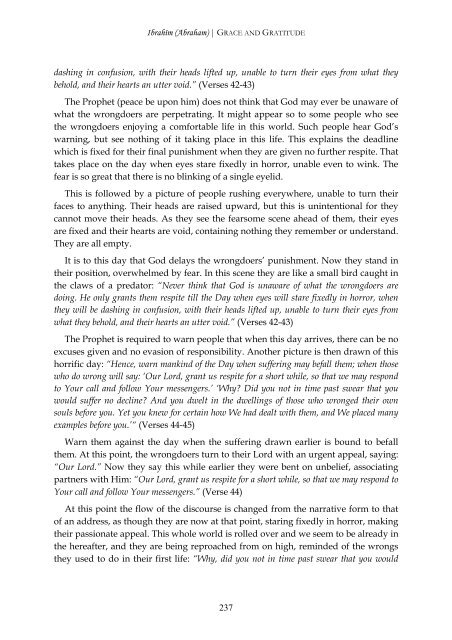Volume 10 Surah 12 - 15 - Enjoy Islam
Volume 10 Surah 12 - 15 - Enjoy Islam
Volume 10 Surah 12 - 15 - Enjoy Islam
Create successful ePaper yourself
Turn your PDF publications into a flip-book with our unique Google optimized e-Paper software.
Ibrahīm (Abraham) | GRACE AND GRATITUDE<br />
dashing in confusion, with their heads lifted up, unable to turn their eyes from what they<br />
behold, and their hearts an utter void.” (Verses 42-43)<br />
The Prophet (peace be upon him) does not think that God may ever be unaware of<br />
what the wrongdoers are perpetrating. It might appear so to some people who see<br />
the wrongdoers enjoying a comfortable life in this world. Such people hear God’s<br />
warning, but see nothing of it taking place in this life. This explains the deadline<br />
which is fixed for their final punishment when they are given no further respite. That<br />
takes place on the day when eyes stare fixedly in horror, unable even to wink. The<br />
fear is so great that there is no blinking of a single eyelid.<br />
This is followed by a picture of people rushing everywhere, unable to turn their<br />
faces to anything. Their heads are raised upward, but this is unintentional for they<br />
cannot move their heads. As they see the fearsome scene ahead of them, their eyes<br />
are fixed and their hearts are void, containing nothing they remember or understand.<br />
They are all empty.<br />
It is to this day that God delays the wrongdoers’ punishment. Now they stand in<br />
their position, overwhelmed by fear. In this scene they are like a small bird caught in<br />
the claws of a predator: “Never think that God is unaware of what the wrongdoers are<br />
doing. He only grants them respite till the Day when eyes will stare fixedly in horror, when<br />
they will be dashing in confusion, with their heads lifted up, unable to turn their eyes from<br />
what they behold, and their hearts an utter void.” (Verses 42-43)<br />
The Prophet is required to warn people that when this day arrives, there can be no<br />
excuses given and no evasion of responsibility. Another picture is then drawn of this<br />
horrific day: “Hence, warn mankind of the Day when suffering may befall them; when those<br />
who do wrong will say: ‘Our Lord, grant us respite for a short while, so that we may respond<br />
to Your call and follow Your messengers.’ ‘Why? Did you not in time past swear that you<br />
would suffer no decline? And you dwelt in the dwellings of those who wronged their own<br />
souls before you. Yet you knew for certain how We had dealt with them, and We placed many<br />
examples before you.’“ (Verses 44-45)<br />
Warn them against the day when the suffering drawn earlier is bound to befall<br />
them. At this point, the wrongdoers turn to their Lord with an urgent appeal, saying:<br />
“Our Lord.” Now they say this while earlier they were bent on unbelief, associating<br />
partners with Him: “Our Lord, grant us respite for a short while, so that we may respond to<br />
Your call and follow Your messengers.” (Verse 44)<br />
At this point the flow of the discourse is changed from the narrative form to that<br />
of an address, as though they are now at that point, staring fixedly in horror, making<br />
their passionate appeal. This whole world is rolled over and we seem to be already in<br />
the hereafter, and they are being reproached from on high, reminded of the wrongs<br />
they used to do in their first life: “Why, did you not in time past swear that you would<br />
237

















